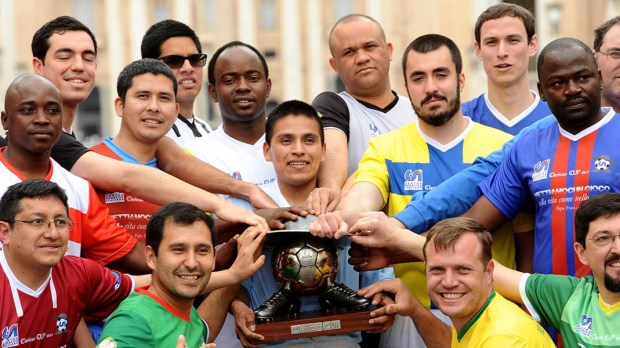The Clericus Cup, a soccer tournament in which priests and seminarians from Roman universities and colleges face off, began in February and will end in late May.
Regarding this unique event, I.MEDIA interviewed Bishop Melchor Sánchez de Toca Alameda, sub-secretary of the Pontifical Council for Culture. As the head of the Sports and Faith section, he represented the Holy See for the opening of the Winter Olympics in Pyeongchang.
What can the faith contribute to sports?
The answer is found in the Vatican II Pastoral Constitution Gaudium et spes, which focuses on the relationships between the Church and the world: what the Church receives from the world and what it can give to it. More specifically, I believe that sports needs extra moral “vitamins.” More than values, it needs virtues, which is the strength to live according to these values on which the whole world agrees. Around sports, one often sees violence, racism, corruption … that disfigure sports. The Church and the faith can thus contribute moral resources. To help sports remain faithful to its true nature.
And what can sports contribute to the faith?
To quote the Latin Terence, whom Pope Paul VI cited in one of his audiences: humani nihil a me alienum. That is, nothing of what is human is alien to me. Sport’s educational values are not foreign to the Christian life. These values of discipline, of striving, of esprit de corps, humility, friendship… Many of these principles can be integrated in the processes of growth in the faith. The great educator saints used games and sports at the service of catechesis. Passing on the faith is not just a matter of passing on some ideas, but of enabling growth in life and in the faith. Don Bosco made the youth play, not just sports but also musical instruments and in theater.
You represented the Holy See in South Korea for the International Olympics Committee meeting and for the opening of the Olympic games in Pyeongchang. What did your presence mean for the Vatican?
This was the first time that the Holy See was officially invited to the Olympic Games, although it had sent delegations previously. This is a first step between the Vatican and the Olympic Committee, which is a bit of the “United Nations of Sports.” The entire world gathers around the Olympic Games.
This year, we were able to see the power of Olympic diplomacy with the mixed delegation of the two Koreas, gathered under the same flag of a united Korea. It is proof that the power of sports can be harnessed for peace. The rapprochement between the Holy See and the Olympic Committee is thus excellent news, and we need to work on developing that relationship.
However, I don’t think we need to wait for a Vatican delegation to participate in the next Olympic Games! That’s not its mission. The Holy See should participate with the voice of morality, as an observer. This will allow it to participate in life, to discuss, to express its ideas. The creation of a Vatican team would have no meaning, except perhaps for symbolic reasons.
What is your prediction for the Clericus Cup?
There is an imbalance between the seminarians and the priests. The seminarians are in the splendor of their strength and energy, while the priests already have quite a few years behind them and have trouble keeping up with the speed of a match. The winners will probably be the seminarians. The teams of the Urbanian Pontifical University, the Gregorian Pontifical University, and the Mater Ecclesiae Pontifical College are — in my opinion — the strongest.

